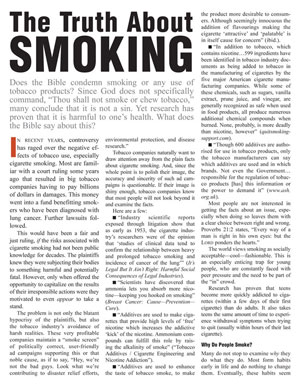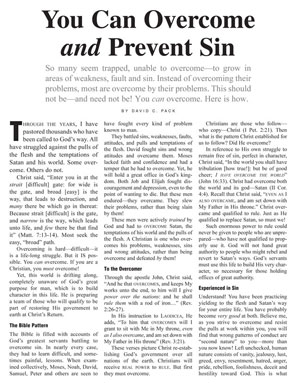In recent years, controversy has raged over the negative effects of tobacco use, especially cigarette smoking. Most are familiar with a court ruling some years ago that resulted in big tobacco companies having to pay billions of dollars in damages. This money went into a fund benefitting smokers who have been diagnosed with lung cancer. Further lawsuits followed.
This would have been a fair and just ruling, if the risks associated with cigarette smoking had not been public knowledge for decades. The plaintiffs knew they were subjecting their bodies to something harmful and potentially fatal. However, only when offered the opportunity to capitalize on the results of their irresponsible actions were they motivated to even appear to take a stand.
The problem is not only the blatant hypocrisy of the plaintiffs, but also the tobacco industry’s avoidance of harsh realities. These very profitable companies maintain a “smoke screen” of politically correct, user-friendly ad campaigns supporting this or that noble cause, as if to say, “Hey, we’re not the bad guys. Look what we’re contributing to disaster relief efforts, environmental protection, and disease research.”
Tobacco companies naturally want to draw attention away from the plain facts about cigarette smoking. And, since the whole point is to polish their image, the accuracy and sincerity of such ad campaigns is questionable. If their image is shiny enough, tobacco companies know that most people will not look beyond it and examine the facts.
Here are a few:
- “Industry scientific reports exposed through litigation show that as early as 1953, the cigarette industry’s researchers were of the opinion that ‘studies of clinical data tend to confirm the relationship between heavy and prolonged tobacco smoking and incidence of cancer of the lung’” (It’s Legal But It Ain’t Right: Harmful Social Consequences of Legal Industries).
- “Scientists have discovered that ammonia lets you absorb more nicotine—keeping you hooked on smoking” (Breast Cancer: Cause—Prevention—Cure).
- “Additives are used to make cigarettes that provide high levels of ‘free’ nicotine which increases the addictive ‘kick’ of the nicotine. Ammonium compounds can fulfill this role by raising the alkalinity of smoke” (“Tobacco Additives / Cigarette Engineering and Nicotine Addiction”).
- “Additives are used to enhance the taste of tobacco smoke, to make the product more desirable to consumers. Although seemingly innocuous the addition of flavourings making the cigarette ‘attractive’ and ‘palatable’ is in itself cause for concern” (ibid.).
- “In addition to tobacco, which contains nicotine…599 ingredients have been identified in tobacco industry documents as being added to tobacco in the manufacturing of cigarettes by the five major American cigarette manufacturing companies. While some of these chemicals, such as sugars, vanilla extract, prune juice, and vinegar, are generally recognized as safe when used in food products, all produce numerous additional chemical compounds when burned. None, probably, is more deadly than nicotine, however” (quitsmokingsupport.com).
- “Though 600 additives are authorised for use in tobacco products, only the tobacco manufacturers can say which additives are used and in which brands. Not even the Government…responsible for the regulation of tobacco products [has] this information or the power to demand it” (www.ash.org.uk).
Most people are not interested in getting the facts about an issue, especially when doing so leaves them with a clear choice between right and wrong. Proverbs 21:2 states, “Every way of a man is right in his own eyes: but the Lord ponders the hearts.”
The world views smoking as socially acceptable—cool—fashionable. This is an especially enticing trap for young people, who are constantly faced with peer pressure and the need to be part of the “in” crowd.
Research has proven that teens become more quickly addicted to cigarettes (within a few days of their first cigarette) than do adults. It also takes teens the same amount of time to experience withdrawal symptoms when trying to quit (usually within hours of their last cigarette).
Why Do People Smoke?
Many do not stop to examine why they do what they do. Most form habits early in life and do nothing to change them. Eventually, these habits seem as natural as breathing, sleeping and eating.
Children pick up habits—good and bad—from their parents. This is why Solomon was inspired to write, “Train up a child in the way he should go: and when he is old, he will not depart from it” (Prov. 22:6).
In 1992, the Journal of the American Medical Association reported that “75% of all teenagers who smoke have parents who smoke.” All too often, parents adopt the child-rearing philosophy of, “Do as I say, not as I do.” They may try to impress upon their children the serious adverse effects of certain behaviors, yet display those behaviors themselves. They may say, “Now kids, don’t smoke because it will kill you,” while supporting a carton-a-week habit. This sends a confusing message to children, one they may translate into license to do whatever feels good or gains them peer acceptance.
Statistics from the World Health Organization show that each day between 80,000 and 100,000 children smoke for the first time. Approximately 50 percent of them will regularly smoke from that point forward. That translates into up to 18.25 million new habitual smokers each year. Many of these kids look no further than their peers when making decisions between right and wrong.
God’s Word shows the error of this approach. I Kings 12:1-15 records an example from the history of ancient Israel. It shows the disastrous results of a young leader who followed bad advice from his peers instead of wise counsel from his elders. The book of Proverbs has much instruction about heeding the advice of those older and wiser than ourselves, especially our parents (1:8; 3:1-2; 4:1, 20; 6:20; 16:31).
The media plays an enormous role in making cigarette smoking attractive and appealing to kids. It glamorizes smoking on television and in movies. Advertising generally targets young audiences, sometimes in very subtle ways. Consider the following sarcastic quote: “The August 2001 issue of Rolling Stone
magazine has a 2-page cigarette ad right smack in the middle. But that’s okay, because [on] the cover of that issue there’s just a picture of [a popular music performer]…We’re sure no one under 18’s ever heard of him or his band—they appeal to a much older audience. So a cigarette ad in that magazine will probably never be seen by any young girls or anything. Just like the tobacco companies agreed” (thetruth.com).
Tobacco companies use various tactics in their ad campaigns. Certain magazine ads and billboards display images of “macho men” to appeal to vanity. One popular brand even subtly promotes bestiality! Some brands specifically target women, taking subtle shots at traditional values and God-ordained roles. Many advertisements emphasize youthful vitality, sex appeal and freedom from restraints, seeking to attract young people facing these issues.
On the surface, all of this may seem glamorous and exciting. But Christ said, in John 7:24, “Judge not according to the appearance, but judge righteous judgment.” Behind all the glitz, glamour, and machismo masking the cigarette industry are ugly, frightening facts.
For instance:
- “In the USA several tobacco companies have publicly admitted that smoking is addictive. In 1997 the smallest of the big five US tobacco companies (the Liggett Group) admitted that it had raised the nicotine content in cigarettes to increase their addictiveness” (Health Psychology: Theory, Research and Practice).
- “Many smokers choose ‘low-tar,’ ‘mild,’ ‘light,’ or ‘ultra-light’ cigarettes because they think that these cigarettes may be less harmful to their health than ‘regular’ or ‘full-flavor’ cigarettes. Although smoke from light cigarettes may feel smoother and lighter on the throat and chest, light cigarettes are not healthier than regular cigarettes. The truth is that light cigarettes do not reduce the health risks of smoking. The only way to reduce a smoker’s risk, and the risk to others, is to stop smoking completely” (National Cancer Institute, “The Truth About ‘Light’ Cigarettes: Questions and Answers”).
- “According to a…report issued by the Office of the Surgeon General, 400,000 adults die every year from smoking-related illnesses, making smoking the number one cause of preventable disease and death in the nation” (www.sciencefriday.com).
Even after examining the facts, some might still argue, “It’s my body. If I want to smoke, it’s my business. Besides, it’s not hurting anybody else.” This shallow reasoning has been used to validate all kinds of wrong behavior and actions: pre-marital and extra-marital sex, alcoholism, drug abuse, prostitution, abortion, etc. Proverbs 14:12 states, “There is a way which seems right unto a man, but the end thereof are the ways of death.”
When approached with the moral implications of smoking, some will even argue, “The Bible does not say, ‘Thou shall not smoke.’”
That may be true, but…
What Does the Bible Say?
The Bible does not directly state that smoking is a sin. But it does teach many principles of right human conduct and behavior, clearly showing that habits such as smoking violate God’s supreme laws: love toward God and love toward fellow man (Matt. 22:36-40).
Ask yourself, “When I smoke, am I trying to please God, other people or myself?” If you answer honestly, you will realize that you are not doing it to please God, the One who created the heavens, the earth, and the human body.
God’s people are led by His Spirit (Rom. 8:9). I Corinthians 6:19-20 states, “What? Know you not that your body is the temple of the Holy [Spirit] which is in you, which you have of God, and you are not your own? For you are bought with a price: therefore glorify God in your body, and in your spirit, which are God’s.”
What does it mean to “glorify God in your body, and in your spirit”? It means that the fruits of the Holy Spirit should be evident in your life: love (outgoing concern), joy, peace, longsuffering, gentleness, goodness, faith, meekness and temperance (self-control) (Gal. 5:22-23).
Understand that you are not pleasing others by smoking. Do other people enjoy inhaling your secondhand smoke? In Philippians 2:3-4, the apostle Paul exhorts us to “…in lowliness of mind let each esteem other[s] better than themselves. Look not every man on his own things, but every man also on the things of others.” Paul is not saying that we should covet (desire) the things of others, but rather that we should show concern for their well-being.
In I Corinthians 13:5, he states, “[Charity (love—outgoing concern)] does not behave itself unseemly, seeks not her own…” Someone who is concerned for the well-being of others takes their feelings and needs into consideration.
In Matthew 7:12, Christ said what came to be known as “The Golden Rule”: “Therefore all things whatsoever you would that men should do to you, do you even so to them: for this is the law and the prophets.”
In Ephesians 5:29, Paul wrote, “For no man ever yet hated his own flesh; but nourishes and cherishes it…”
No one enjoys breathing polluted, foul-smelling air. Even the smoker would admit that he would rather live in an area with fresh air, than where there is prevalent smog.
Violates Sixth Commandment
In Matthew 19:19, Christ repeated the principle of love toward others: “…You shall love your neighbor as yourself.” He was summarizing Commandments five through ten, which provide the basic principles of how we are to treat our fellowman—that includes the Sixth Commandment, which simply states, “You shall not kill” (Ex. 20:13; Deut. 5:17). (To learn more, read our book The Ten Commandments – “Nailed to the Cross” or Required for Salvation?)
In addition to all the medical evidence proving that one who smokes is slowly killing himself (prolonged
suicide, or self-murder), there is enough evidence proving that the smoke he exhales is harmful, and potentially fatal, to those inhaling it as secondhand smoke.
Again, some facts demonstrate this:
- “Exposure to environmental tobacco smoke (ETS) is responsible for approximately 3,000 lung cancer deaths per year among nonsmokers” (Healthy People 2000, emphasis ours).
- “Infants of parents who smoke have higher mortality rates throughout the first year of life than do infants of nonsmoking parents, primarily because of the contribution of ETS to SIDS and other respiratory illnesses” (Pediatrics, November 2000).
- “It has been estimated that the total nicotine dose received by children whose parents smoke is equivalent to their actively smoking between 60 and 150 cigarettes per year” (East Mediterranean Health Journal, “Effects of Passive Smoking on Children’s Health: A Review”).
- “Babies exposed to secondhand smoke are almost twice as likely to develop allergies to inhaled allergens such as animal hair as infants who are not exposed to tobacco smoke. Children whose parents smoke are almost 50% more likely to be allergic to certain foods” (Medical News Today).
- “In the U.S., tobacco kills more Americans than AIDS, alcohol, car accidents, murders, suicides, drugs, and fires combined” (www.thetruth.com).
Ultimately, smoking is a form of hate. Many who smoke display a complete disregard for those around them. The very necessity for “No Smoking” signs demonstrates this. Most people do not naturally concern themselves with even the basic needs of others. Many smokers do not consider that those around them find it uncomfortable to dine, shop, work or enjoy anything while inhaling secondhand smoke.
I John chapters 3 and 4 contain instruction concerning how we are to show love toward others. You may wish to read them to understand how the principle of “love toward man” is violated when one smokes.
Violates Tenth Commandment
Stop and think! Realize that, ultimately, you do not even smoke to please yourself. You do it because it tames a psychological craving or appetite, just as someone with an eating disorder seeks to appease an unbalanced mental perception. That motivation is based on covetousness, which violates the Tenth Commandment (Ex. 20:17; Deut. 5:21).
Some may argue, “I am not desiring something that belongs to someone else. I buy my own cigarettes and smoke them!” But another underlying motivation for those chained to addictive habits is the lust for certain lifestyles.
As previously mentioned, cigarette manufacturers employ advertising tactics that appeal to vanity. The conveyed message is: “If you want to go somewhere in life, amount to something, be somebody, then you should smoke, because everybody who is anybody does it.”
This same line of reasoning was the cause of the fall of the archangel Lucifer (transforming him into Satan the devil): “For you have said in your heart, I will ascend into heaven, I will exalt my throne above the stars of God: I will sit also upon the mount of the congregation, in the sides of the north: I will ascend above the heights of the clouds: I will be like the Most High” (Isa. 14:13-14).
Lucifer was not content with the power and responsibility that he had been given. He wanted more.
Addiction Is Idolatry
You have probably never considered that any addictive habit, including smoking, is a form of idolatry. God forbids it in the First Commandment: “You shall have no other gods before Me” (Ex. 20:3; Deut. 5:7).
How does smoking put “other gods” before the one true God? Paul asked, in Romans 6:16, “Know you not, that to whom you yield yourselves servants to obey, his servants you are to whom you obey; whether of sin unto death, or of obedience unto righteousness?”
If you have an addictive habit, you are a slave to it, whether it is alcoholism, drug addiction, nicotine dependence, etc. It literally becomes an addict’s god, because it drives his thoughts and actions. In Hebrews 12:1, we read, “…let us lay aside every weight, and the sin which does so easily beset us, and let us run with patience the race that is set before us.” God expects us to face our problems head-on and to overcome them. Those who do are promised great rewards: “Him that overcomes will I make a pillar in the temple of My God…” (Rev. 3:12). (Read our article “You Can Overcome and Prevent Sin.”)
What You Do With What You Know
God judges us according to what we do with the knowledge that we have. If a person smokes, unaware of the health hazards, then “…the times of this ignorance God winked at; but now commands all men everywhere to repent [change]” (Acts 17:30).
In I Peter 1:13-14, we are exhorted to “…gird up the loins of [our] mind…as obedient children, not fashioning [ourselves] according to the former lusts in [our] ignorance.” The apostle James was inspired to write, “…to him that knows to do good, and does it not, to him it is sin” (Jms. 4:17). If a smoker is aware of the dangers he exposes himself to and turns a deaf ear to the warnings, God will hold him accountable for his actions!
Overcoming Is a Process
Overcoming any bad habit or sin is not easy. It is a lifelong process, because no one is or will be perfect as long as he is a flesh-and-blood human being. All Christians battle three enemies: (1) Satan; (2) the pulls of this world; and (3) our own human nature.
But if you follow the steps below, individual sins can
be overcome.
1. Admit to yourself and to God that you have a problem. This is the first, great step toward eliminating sin from our lives. James 1:23-24 states, “For if any be a hearer of the word, and not a doer, he is like unto a man beholding his natural face in a glass: For he beholds himself, and goes his way, and straightway forgets what manner of man he was.”
Merely seeing a problem in your life will not make it go away. You have to acknowledge it and determine to do something about it. I John 1:9 states, “If we confess our sins, He [God] is faithful and just to forgive us our sins, and to cleanse us from all unrighteousness.” Once we do our part, God has promised to do His.
2. Realize that with God’s help, you can “kick the habit.” Pray and ask God for His help. As Paul stated in Philippians 4:13, “I can do all things through Christ which strengthens me.” There is no trial that you face that Christ does not understand. Hebrews 4:15 gives us encouragement: “For we have not an High Priest which cannot be touched with the feeling of our infirmities; but was in all points tempted like as we are, yet without sin.”
3. Tell yourself that “quitting is quitting,” not merely cutting back. Gradually quitting is not quitting! Smokers often think they can quit by placing a limit on the number of cigarettes they smoke—leaving a temptation. But Christ commands us to “…pray, that you enter not into temptation: the spirit indeed is willing, but the flesh is weak” (Matt. 26:41). In James 1:14, we are instructed to avoid compromising situations: “But every man is tempted, when he is drawn away of his own lust, and enticed.”
4. Seek medical advice. Making a sudden, drastic change in an addictive habit (especially if it has been practiced for years) will carry certain health side effects. But they could be curbed if addressed properly and in a timely fashion.
5. Do not be discouraged. When trying to overcome an addiction, you may find that you are tempted to fall right back into it. I Peter 5:8-9 exhorts, “Be sober, be vigilant; because your adversary the devil, as a roaring lion, walks about, seeking whom he may devour: Whom resist steadfast in the faith, knowing that the same afflictions are accomplished in your brethren that are in the world.”
Satan does not want you to succeed in overcoming and receive the reward that he knows he can never have—sonship in God’s kingdom (Heb. 2:10; Rev. 21:3). Satan will put every imaginable obstacle in your way. Remember, you are wrestling against “…principalities, against powers, against the rulers of the darkness of this world, against spiritual wickedness in high places” (Eph. 6:12).
By diligently applying the principles above, you will be able to successfully overcome smoking.
“You will gain many benefits from your decision to quit smoking. Most importantly, it may save your life. Those who quit smoking decrease their risk of lung disease, heart disease, emphysema and cancer. They are proud to be rid of the hacking coughs, the messy ash trays, the smell of stale smoke at home, in their cars and on their clothes and hair, and the nicotine stains on their fingers and teeth. Some people report rejuvenation in their senses of smell and taste as well as increased vitality. But for most, the first noticeable difference is a sense of pride in knowing they have ‘kicked the habit’” (www.aquitsmoking.com).
God commands us to, “Set your affection on things above, not on things on the earth” (Col. 3:2). What will you do?





















